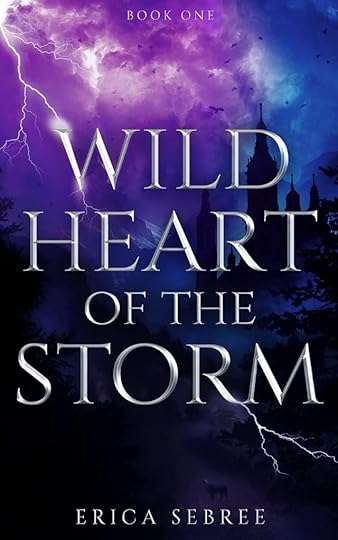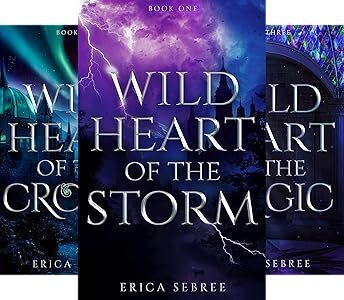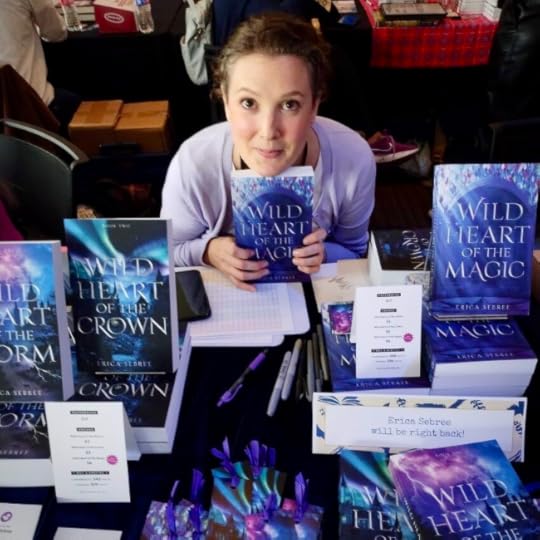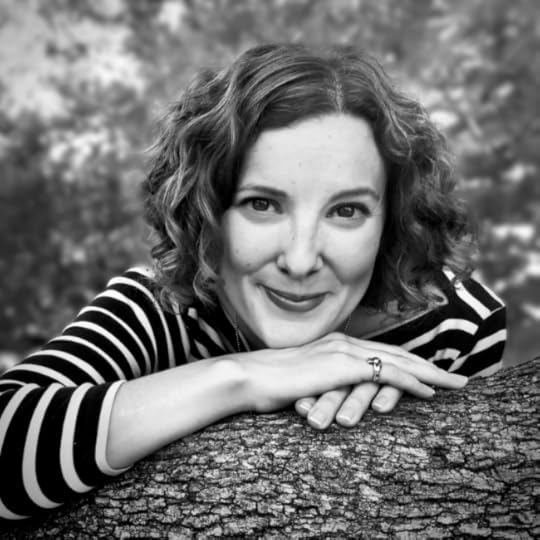Author Interview – Erica Sebree

Helen: Welcome Erica. I am very excited to learn more about your series. I saw your latest book, Wild Heart of the Magic released on May 1st, 2024 and you’re working on book four. Tell us a little about it.
Erica: I’m currently working on the fourth book in the Wild Heart fantasy series. Because it’s a series, I’ll tell you a little about books 1-3. Wild Heart of the Storm is the first in the series, and follows the classic fantasy quest trope. The main character comes into her magic unexpectedly when she brings a dead wolf back to life. Not long after, assassins track her down, and she’s forced to flee with the mysterious town metalsmith. Book one features secret identity, found family, untamed magic, and confronting the past. Book two, Wild Heart of the Crown, dives into court intrigue, ancient secrets, and a desperate attempt to heal a barren landscape. Court members continue their scheming in book three, Wild Heart of the Magic, which grows to include hordes of prospective noblemen. With the alarming truths revealed in book two and the barrenness continuing to spread, hidden objects imbued with dark magic must be found (and destroyed) before it’s too late. Book four, Wild Heart of the Darkness, tackles the fallout of the events at the end of book three, and includes a journey back across the sea.
Helen: I love the colours of your covers. What were your thoughts behind the cover design?
Erica: Wild Heart of the Storm features a vast landscape that represents both the starting and ending points of the main character’s journey. It also features her strongest magical ability, wielding storms.
Wild Heart of the Crown takes place mostly in the capital city, so I wanted to feature a portion of the palace—particularly the glass dome of the throne room—and the magical lights (a reflection of magic in the land) in the night sky.
Wild Heart of the Magic revolves around…magic! The unordained priestesses also become more central in book three, so illustrating the opulent temple from the beginning of the book seemed like the perfect setting.

Helen: I love learning the detail behind the covers. I think titles are sometimes even harder to think up! How did you come up with your titles?
Erica: The title for Wild Heart of the Storm came about in a couple of different ways. When I first started compiling a list of all the keywords that described the book, I kept coming back to “wild heart” and was reminded of the movie I saw when I was a kid, Wild Hearts Can’t be Broken. It’s a story about a woman who performs high-dives into tiny pools…on a horse! How incredible is that? So I knew I wanted to include “wild heart” in the title. More specifically, the title highlights all of the main character’s magical abilities: wild represents her ability to grow and direct plants, heart represents her life-giving power, and storm represents her storm magic. But wait, there’s more! “Wild heart” also represents the main character’s independence, and “heart of the storm” illustrates the final battle in book one. As for the series, I wanted to carry that naming structure through to each book. Wild Heart of the Crown focuses a lot on the main character’s new role as queen, and Wild Heart of the Magic brings the magic of their world to the forefront.
Helen: Writing a series is such fun, beacuse you can really dig into the characters and thier backstories. Who was your favourite character to write?
Erica: Both Hazel and Cadwyn are my favorites! I just love fiercely loyal friends. Don’t get me wrong, I’m a big fan of the love interests too (I read a lot of romance), but the unwavering friendships are where the heart of the story is.
Helen: If your main character could answer this question, why would they say we should read your book?
Erica: She would tell you that strength is always inside you, even when it feels out of reach. She’d tell you to find small moments of joy, and to laugh even when things feel beyond overwhelming. She’d tell you to take care of the people, animals, and land under your protection—though the author argues that self-sacrificing isn’t the only way to do this. And finally, she’d tell you that family can be found anywhere, and those who seem prickly at first might end up being your fiercest allies.
Helen: Lovely answer! Which genre do you prefer to write?
Erica: I love writing fantasy because I have the privilege of creating the world. It’s incredibly freeing. There’s a lot that goes into it—geography, history, government, social structures, magic systems—but it also means I get to create a space that’s more equitable and inclusive. And just like reading fantasy offers an escape from the stresses of our lives and the chaos of the world, writing fantasy does too. I feel like I’m able to correct some of the injustices I’ve experienced or witnessed. It’s far from perfect, but it’s a small way I can take action—even if only for my own peace of mind.

Helen: I love world building as well. I sometimes think the new world is almost another character with its own quirks and foibles. If world building frees you, which element of the writing process do you find most challenging and why?
Erica: I have such a hard time with transitions! I’m a very organized writer, so I know all the plot points and character arcs. I find inspirational images for locations, structures, weapons, clothing…you name it! But when it comes time to flow from one scene to the next, I get stuck. I don’t always feel like a scene break is appropriate, especially if only a short amount of time passes between the two scenes. I also want the transition to contribute something to the story. Even if those couple of lines don’t move the plot forward, I hope they offer a glimpse into the fantasy world or the dynamics between characters.
Helen: Most indie authors work as well write. How do you fit writing into your everyday life?
Erica: I’ve tried a lot of things over the years (while working a full-time job), and I’ve found that writing for about an hour most evenings is ideal. When I attempted to write in the mornings before work, my mind was free from distractions, but my creativity was lacking. By waiting until the evening to write or outline, I find that ideas and words come to me more easily. And with all my tasks completed for the day, my mind doesn’t wander much.
Helen: Do you plan your books, or are you more of a pantser, making it up as you go?
Erica: I’m a bigtime planner! I had over one-hundred pages of outlines and character descriptions before I started writing the first book in this series. My planning technique of choice is the Snowflake Method. It’s about starting small, then expanding. Over and over. For example, you start with one sentence that describes your story, then expand it to two sentences, then a paragraph, then a page, then four pages. By that point in the process, the plot is pretty clear. Next comes the character summaries. Along with their own sub-plots, each character needs a backstory, motivations, goals, conflicts, and an epiphany (or two). Finally, you outline every scene in the book. I use a spreadsheet so I can reorganize as needed. Others might prefer a text document or a program like Scrivener. The thing I love most about this process (aside from all the organization) is that it’s difficult to run into writer’s block with everything planned out so well. I highly recommend it for anyone that prefers planning or needs guidance with building out their characters.
Helen: There are a lot of methods out there, I think it is key to find the one that works for you. Every writer experiences self-doubt. How do you overcome the fear and the little voice in your head to keep writing?
Erica: Before I wrote my very first chapter, I listed all the things that scared me about taking on this huge project. I worried my writing wouldn’t be any good. I worried I wouldn’t finish the book, let alone five. I worried no one would read my books, or if they did, that they wouldn’t like them. That small exercise took away a lot of my anxiety about writing and publishing. When I need a confidence boost, I go back and read that list. Then I remind myself that I did write a book (three so far), that people do actually read them, and most seem to like them!
Helen: What is the most useful piece of writing advice you’ve received, and by whom?
Erica: Owen and Jodi Egerton spoke at a writing conference that I attended several years ago, and they were delightful! I felt so inspired that I immediately bought their book, This Word Now. There’s a lot of wonderful advice in that short book, but the part that really stuck with me was about writing for yourself and no one else. I have to remind myself of that whenever I start thinking about the audience or doubting my work.
Helen: Great advice. I write for the joy of it. I am fortunate that when I decided to self-publish, my books were well recieved. You have to enjoy your writing in the first place. When you encounter writer’s block, what do you do to overcome it?
Erica: Luckily, writer’s block doesn’t happen too much for me (except with those pesky transitions), but when it does creep up, I step away from my computer. Going for a walk is ideal, depending on the time of day. But any mundane tasks—cooking, folding laundry, or watering the plants—really help to reset my creativity. And the adage that great ideas come to you in the shower is one-hundred percent true!
Helen: Thank you so much for joining me today, Erica. It has been great meeting you. Just to finish, what advice would you share with aspiring writers?
Erica: Find what works best for you! When I first started writing, I heard a lot of the write-every-day advice, and that simply didn’t work for me. I had to figure out what my own process looked like, as I think every writer should. If writing is—or becomes—a struggle, try something different. Does writing in the morning or the evening work better for you? How long can you write and still feel like your creativity is flowing—one hour, four hours, 20 minutes? Where do you write best, at home or at a coffee shop? Do you need absolute silence or does music help? Experiment with different methods of writing. If plotting and outlining isn’t working, try stream of consciousness writing. Does your story flow better when you write in a linear fashion or should you jump around to different scenes? And if a particular scene isn’t coming out the way you’d intended, try writing it from a different character’s point-of-view.
About the Author Erica Sebree
Erica SebreeErica Sebree lives in Austin, Texas, where she works in public service as a graphic designer. She reads too much romance and drinks too much tea—usually at the same time. She makes frequent attempts at gardening, and will happily talk to any animal who crosses her path. She believes lists should be written in colorful ink, and dreams of one day having a farm sanctuary with many adorable cows. When she escapes into fantasy worlds, it’s to places where magic is vital, animals are guardians, and a stubborn bodyguard’s only weakness is the fierce, reluctant heroine he’s sworn to protect.
Follow Erica:
Author WebsiteTwitter/XFacebookInstagramTikTokThreadsGoodreadsBookBubAmazon Author PagePurchase Erica’s book, Wild Heart of the Storm:
Link to book on Amazon UK: eBook | Paperback
Link to book on Amazon US: eBook | Paperback
As an Amazon Associate I may benefit from purchases made using these links.
If you enjoy epic fantasy then check out my award winning Sentinal series, which is now complete. If you like fantasy books with a touch of romance then you will love my SoulMist series, start with SoulBreather. Prefer Dystopian Science Fantasy? Then try Harmony. Start the adventure and stay for the journey.
Sign up to my newsletter and download a free novella called Sentinals Stirring and get notified when my next books are published.
Sign up to my newsletter and download a free copy of Sentinals Stirring
By clicking the sign up button above, you agree to share your email address with the site owner and the newsletter platform provider to receive marketing, updates, and other emails from the site owner. Use the unsubscribe link in those emails to opt out at any time.
By signing up to my newsletter, you agree to receive commercial information from Helen Garraway, located at 61 Bridge St, Kingston, Hertfordshire, UK (Data Administrator). You can withdraw your consent at any time. The data will be processed until the consent is withdrawn.



